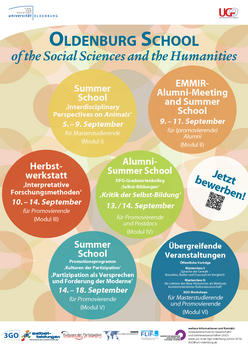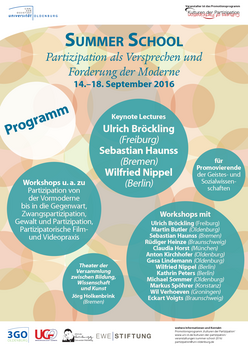Summer School 2016
NEWS
COOPERATIONS
Oldenburg School for the Social Sciences and the Humanities
September 5-18, 2016
Program und Information
Summer School 2016
Summer School 2016
Venue: Carl von Ossietzky Universität Oldenburg
Period: September 14-18, 2016
Language: English/German
Participants: PhD students of the humanities and social sciences
Participation as a Promise and Claim of Modernity
In modern western societies, the term ‘participation’ is often used as a category of self-description, with the help of which these societies are characterize themselves as allowing its members to actively and passively participate and, at the same time, demand active and passive participation from them. This reference to participation as a category of self-description is made in a number of different ways and in a range of different contexts, for instance in constitutional texts, in educational discourses on concepts of inclusion, or as part of the rhetoric of social movements.
Within these contexts, participation is usually referred to in a normative (and, positive) way. In other words: As a rule, the idea of participation includes the notion of active engagement, which, in turn, is understood as the result of an autonomous and self-dependent decision (“I intend and I am able to take an active part in or to be part of something by my own choice”).
This terminological differentiation, which also allows to conceive of passive participation as a form of participation that does not require an autonomous decision at all, results in a specific requirement for active participation, i.e., one can only participate actively in something he or she is not yet part of. In other words, active participation is only possible in settings characterized by options of entrance and exit. This, in turn, leads to several ambivalences: On the one hand, the idea of active participation grounds on the notion of autonomous actors, on the other hand, these actors are only constituted as participating subjects through their participation in a specific societal context. Moreover, societal contexts and environments regularly limit the autonomy of actors and their options of participation, which also runs counter to the idea of active engagement inherent in the idea of participation. This line of argument, by the way, is often used as the starting point to criticize processes of, e.g., economization, politicization, or the scientification of society. Consequently, it seems as if participation in various societal contexts undermines the claim of autonomy which comes along with the notion of active participation. This becomes even more complex as soon as one considers the promise of autonomy and the differentiation of modern societies to be mutually constitutive. From this perspective, then, the interdependence between individual autonomy and societal differentiation may be read as a paradox: the mere option to participate, understood as an offer (“You may participate”), is transformed into an obligation articulated through imperatives such as “You have to participate” or “You have to take an active part voluntarily”.
Within the context of the summer school, the ideas outlined above will be addressed, discussed, and further elaborated on, guided by the following questions:




